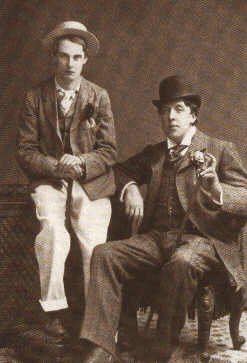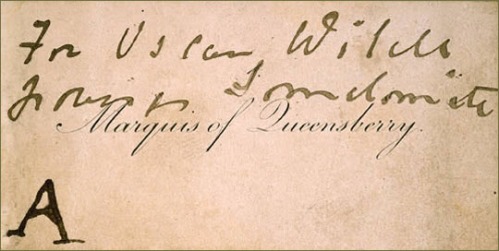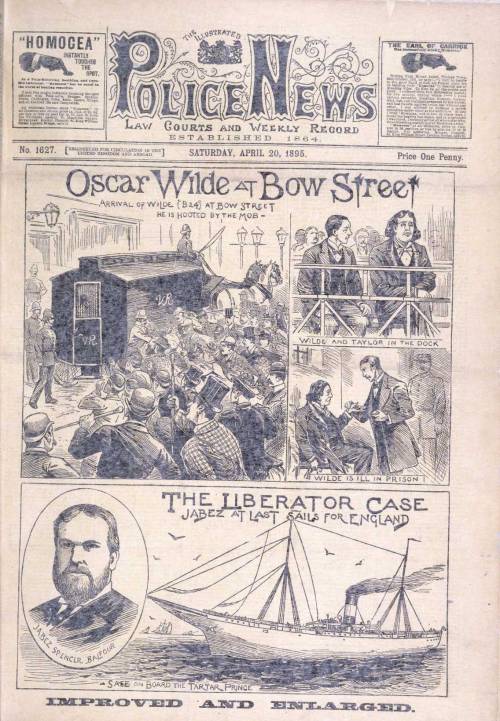25 March 1895
Oscar Wilde was largely the architect of his own downfall. He was jailed on 25 May 1895 after an investigation into his private life. Reacting to what amounted to being ‘outed’, Wilde brought a public prosecution against the Marquess of Queensbury. It was this court case that brought his lifestyle under criminal and public scrutiny.

John Sholto Douglas, the Marquess of Queensberry, was the father of Wilde’s lover, Lord Alfred Douglas. He had left his calling card for Oscar Wilde at his club, The Albemarle, calling him a ‘posing somdomite’ a misspelling of sodomite.

Oscar Wilde’s appearances at the Central Criminal Court, (the Old Bailey) can be traced via the Proceedings of the Old Bailey Online website, a free-to-use, fascinating primary source that I have used frequently in my historical research.
It shows that John Sholto Douglas, Marquess of Queensberry, was indicted for ‘unlawfully publishing a false, scandalous and malicious libel of and concerning Oscar Wilde’.
Douglas pleaded ‘Not guilty’ and offered his justification, declaring that the content of the libel was true and published for public benefit.
It is stated in the ‘Proceedings’ that the details of the case were ‘unfit for publication’.
Douglas was pronounced ‘Not guilty’ after he successfully demonstrated that ‘libelling’ Wilde was for public benefit.
Friends had advised Wilde to escape to France when it became clear that evidence was being sought against him which verified the veracity of Douglas senior’s accusation. Unlike other accused homosexuals when faced with the law, Wilde did not go into exile.
Due to evidence heard in court Oscar Wilde was then arrested.
22 April 1895
Oscar Fingal O’Fflahartie Wills Wilde and Alfred Taylor were indicted for ‘unlawfully committing acts of gross indecency with Charles Parker and other male persons’ along with other counts for conspiracy.

The jury was directed to find a verdict of ‘Not guilty’ on the conspiracy charges. Four counts of indecency ‘with certain witnesses’ were also directed to a ‘Not guilty’ verdict.
The jury was unable to reach a verdict on the remaining counts. Therefore the case was postponed until the next session.
20 May 1895
Oscar Fingal O’Fflahartie Wills Wilde and Alfred Waterhouse Somerset Taylor were indicted for ‘unlawfully committing acts of gross indecency with certain male persons.
The defendants were then tried separately.
Taylor was found ‘Guilty’ on certain counts. Wilde then faced trial and was also found ‘Guilty’. Both defendants were sentenced to two years hard labour.
You can read my post about the incarceration of Oscar Wilde in Reading Gaol here.
Homosexuality was decriminalised in the UK after the 1967 Sexual Offences Act was passed which permitted private relationships between men over the age of 21. Oscar Wilde was posthumously pardoned recently, along with 50,000 other gay men, convicted of crimes that are no longer on the statute books.
To read my post about WWII code-breaker Alan Turing, another man posthumously pardoned, click here.
Sources:
The Proceedings of the Old Bailey Online
| Reference Number | t18950325-336 |
| Verdict | Not Guilty > unknown |
| Reference Number | t18950422-397 |
| Verdict | Miscellaneous > no agreement |
| Reference Number | t18950520-425 |
| Verdict | Guilty > unknown; Guilty > unknown |
| Sentence | Imprisonment > hard labour |


Very interesting!
LikeLiked by 1 person
I just found that – as well as Alan Turing treatment, unbearably sad. I’m so glad that’s changed in our countries but it’s still happening elsewhere and that is a travesty.
As an aside – Sholto! There’s a name that died out!
LikeLiked by 1 person
I love Victorian names! I took photos of several graves on a visit to Derbyshire, there was the grave of a lady called Zelinda, and two gents, Septimus and Ebenezer!
LikeLiked by 1 person
I love them too! They’re so much more fun I think
LikeLiked by 1 person
Ooh, a history of famous writers! That is something i would read. Interesting post again, thanks.
LikeLiked by 1 person